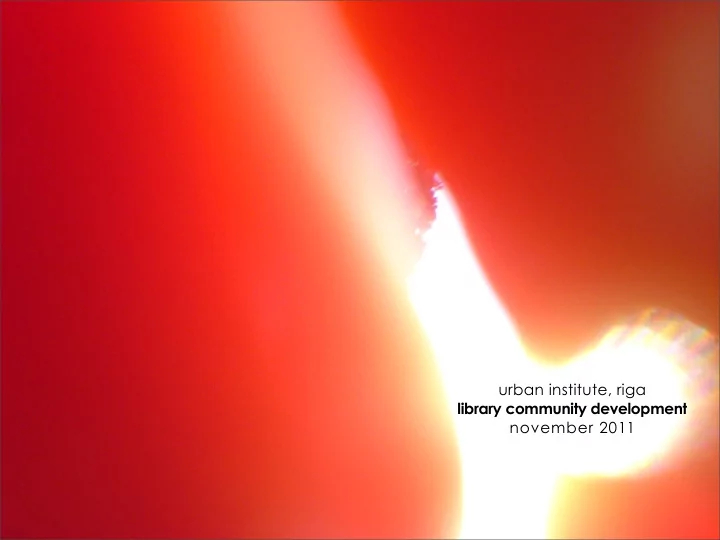

urban institute, riga library community development november 2011
comm unity
communities at risk
Some of the basic threats in key words: • Shrinking communities and rural depopulation; • Declining birth rates as well as a tremendously aging society; • Bankrupt municipalities, hence administrative, social, educative and cultural services in danger of liquidation; • Communities without strategies, hence lacking perspectives; • Unemployment and inhabitants lacking perspectives, thus lacking a clear identity; • Social inclusion is endangered and communities are strongly incoherent; • The danger of returning to oligarchic or other autocratic structures and neglecting the so far achieved democratization process.
culture
Libraries as centers for c o m m u n i t y development / Finland AS AN EXAMPLE OF BEST PRACTICE
• The local civic society as well as informal initiatives have the option to use the space for their purposes (technical equipment is always available); • The libraries are very often been acting as networking centers and information sources for all community and municipality related questions; • Local libraries usually are clear melting points of city societies and are linking all possible social target groups; • Citizen-friendly opening hours are guaranteeing easy access; • Next to their ‘ usual ’ library services, the centers are very often acting as locations for exhibitions for local artists or neighborhood initiatives and as event-venues; • A strong inter-action between libraries, local administration, schools and even public health services guarantees fast access to all kind of valuable information; • Libraries are strongly cooperating with local or regional institutions of adult education and are serving as well as locations for employment-supportive programs; • Librarians are usually highly informative skilled and therefore excellent community moderators; • Libraries are certainly barrier-free, both as architectural as well as socio- psychological, thus offer excellent conditions as a neutral place in tense community situations.
life
Cultural-Social Work & Civic/Political Education
Culture-Social Work is a powerful tool for social inclusion, promoting an intercultural dialogue between different target groups of society and should be used more to foster OUR communities values, such as tolerance, social dialogue, an active work against xenophobia, combating poverty and the exclusion and marginalization of certain society groups
devel opment
Political or Civic Education is an urgently needed instrument, raising societies awareness by supporting each persons self- conscious and knowledge regarding its unique individual needs, interests and how to coop and collaborate with society and its system; in other words: foster communities’ communication
The project proposal
• Community Development and Civic Education as national strategies! • One Cultural-Social Worker in each of a group of selected public libraries - every library, thus each surrounding community environment will be supported by one specially trained community developing Cultural Social Worker. • Community developers are serving on their OWN community! • The projects kicks off as an experimental international collaboration , guided by Finland or Latvia and most likely be joined by Poland as well as assisted by the UK and Germany. • European Fund based employment integration programme, specifically designed for unemployed but socially highly emphatic and skilled persons. • The project has to be developed in strong cooperation with various national, international, state institutions and NGOs • The project development and first multiplying training sessions for a few experimental target regions, preferably not in bigger agglomerations needs support from possible private donors supporting civic society development and political education. • Development of a detailed short-term study line in international cooperation. • Act community focused and with a direct will for implementation!
Cultural work, social work, political or civic education and community development have to run hand in hand in oder to establish a decent democratic impact in society – social cultural centers, libraries and museums are underestimated communicating factors and have to be supported intensively!
Why libraries may be the right location for Cultural Social Work and community development? • Libraries are most often anticipated as independent institutions, therefore easy accessible for all groups of society; • Libraries are existing in nearly all communities; • Libraries are usually offering seminar or meeting rooms; • Libraries are meeting places for the youth as well as for elderly, libraries are therefore per se inter-generative and inter-cultural; • Libraries most likely offer computer and internet access; • Libraries are strongly inter-connected with all existing formal and informal institution in its community; • No other place may better convince and raise awareness among artists and cultural workers, as libraries, cultural centers and local museums. Those actors should be fostered to take an active role, contribute and involve for the sake of social inclusion and social dialogue within the community.
The win-win situation; what do libraries gain from the ‘ at site’ located Cultural Social Work? • More people, thus more ‘ classical ’ users will be attracted to libraries; • The location may develop to the most important independent community location and gains possibly other projects, hence these projects may serve as generators for technical development and architectural reconstruction of the library-location; • Libraries will most likely easier and better fulfill their educative task - a higher density and diversity of social groups offers more recipients and users; • Due to the Cultural Social Worker more advanced technique will be available; • Activities, such as exhibitions, concerts, education, social and health awareness campaigns; • Finally the project may serve as a general financial stabilizer, if not surviving argument for the libraries in the current financial situations of municipalities and regions.
urban institute, riga urban-institute.posterous.com b a l t i c p l a n n i n g @ g m a i l . c o m + 3 7 1 2 9 4 1 0 4 8 7
Recommend
More recommend